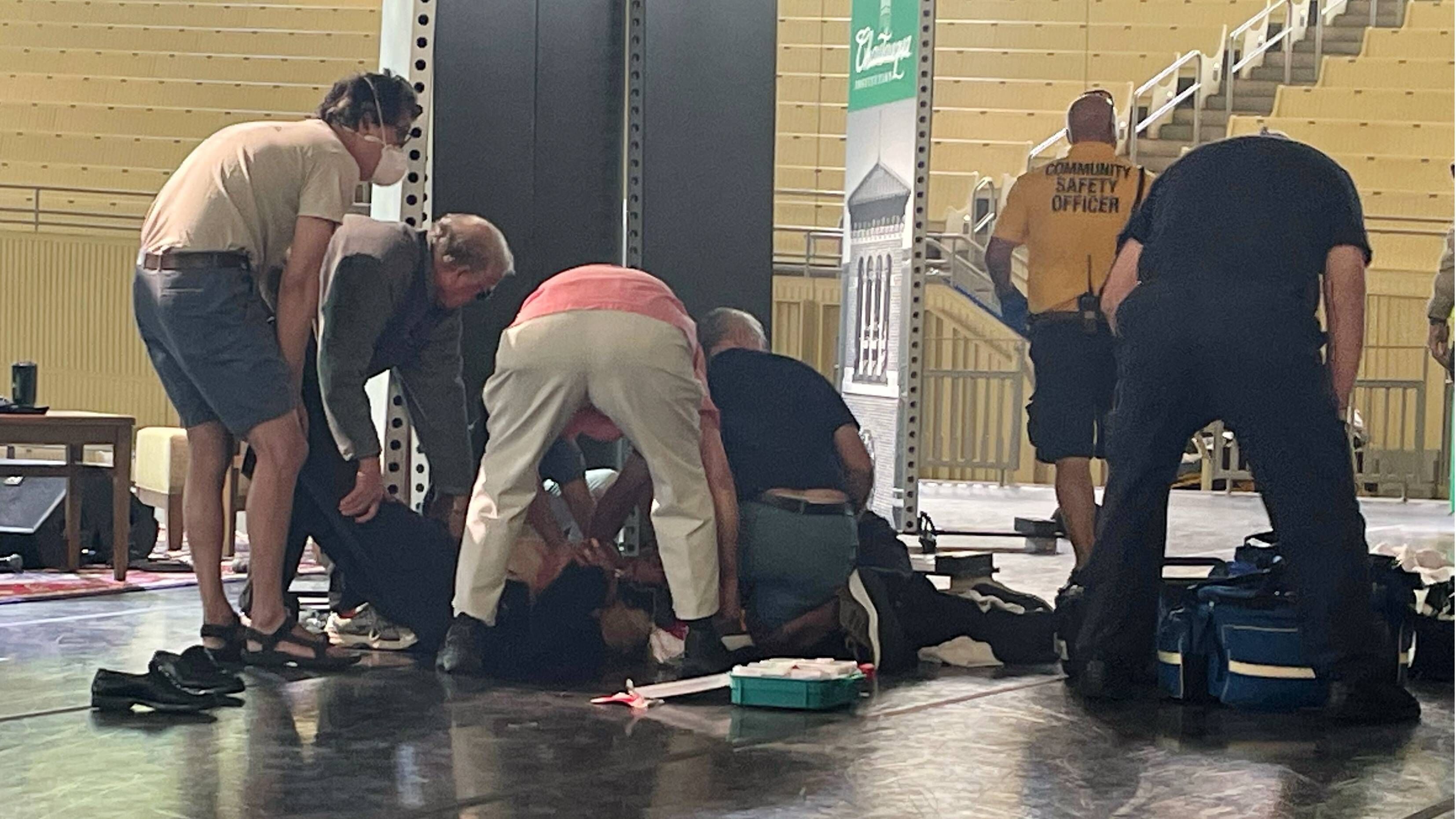Assailed in daylight
The assault on Salman Rushdie indicates the growing influence of Islamic radicalisation

Barely two weeks after the world was heaving a sigh of relief after successful extermination of dreaded Al Qaeda leader Zawahiri, the brutal attack on noted writer Salman Rushdie created a pall of gloom in the security fraternity. In other words, the world is still not safe from religious fanatics even decades after Salman Rushdie was issued a fatwa by Ayatollah Khomeini. A 24-year-old Islamic Shia fanatic, Hadi Matar, now in custody with the New York Police, was responsible for attempting to kill the renowned writer at an event off New York. Rushdie is believed to have suffered a serious liver damage and impairment of vision. The incident calls for a critical examination of the spiralling growth of Islamic radicalisation of enormous proportions pushing the world into an abyss of insecurity and peril.
Meanwhile, reports confirm that a trip to Lebanon in 2018 changed Hadi Matar, making him more devout and less extroverted, according to his mother. After a visit to his estranged father, Silvana Fardos, a Lebanese-born woman from Fairview, New Jersey, described her 24-year-old son as "a moody introvert" who had become increasingly hooked on to Islam. This confirms the extent of indoctrination.
In the meantime, UN Secretary-General Antonio Guterres, US President Joe Biden and European Union (EU) leaders condemned the attack. According to a section of progressive writers, the assault on Salman Rushdie has left them worried about the persistent threats to freedom of writing and of speech in present times. It was so easy for his assailant to pounce on him and riddle him with stab wounds to the neck and torso, which have now left the writer in danger of losing an eye, and indeed paralysis in the remaining years of his life.
Syed Badrul Ahsan, an eminent columnist, feels that one does not have to agree with everything a writer brings forth into the public domain. When Rushdie wrote 'The Satanic Verses' in the late 1980s, large sections of the Muslim community reacted with outrage. The fundamental issue here, according to Badrul Ahsan, is the right of the writer to produce his works in a way he or she feels they should. And the issue, again, is for the readers to read those works or ignore them. It is quite natural that readers may not agree with a writer, for readers too have their opinions on the themes the writer may dwell on. But when a disagreement with a writer translates, in a rather macabre manner, into threats of taking his life, it is a medieval notion of life we give voice to.
The assault on Rushdie takes us back to the fatwa decreed by Ayatollah Khomeini following the appearance of 'The Satanic Verses'. It was an abhorrent instance of a nation's spiritual leader, who had led a revolution, letting the world know that Rushdie had to die. Any defence of Salman Rushdie is rooted in a simple, universal premise — that when an individual wields the pen to give voice to his ideas, it becomes the right of those who do not agree with him to use their pens or their verbal expressions to let people know why they do not agree with him. Informed conversation is the baseline of intellectual debate. But when a writer is forced to go into hiding because a price has been put on his head by a state where politics is but another term for intolerance, the world of ideas is left stunned.
Significantly, Rushdie is not the only writer who has been in danger. Taslima Nasreen, with whom many agree and disagree, has languished abroad because of the absence of moral courage to call her back home. Syed Badrul Ahsan further reckons that writing has always been a hard task, a reality Charles de Gaulle recognised in his wisdom. With Jean-Paul Sartre constantly sniping away at him, he was asked if his government contemplated any action against the writer. De Gaulle had a sophisticated response to the query: you do not arrest Voltaire. Also, Boris Pasternak ran into trouble with the Soviet state and so did Alexander Solzhenitsyn. But the state did not decide that they should die for what they wrote. Sajjad Zaheer's 'Angarey' bore the brunt of attacks by the British, but he was not marched to the gallows. Buddhadeva Bose's 'Raat Bhor Brishti' caused him problems of a legal sort, but no one put a price on his head. DH Lawrence ran into a mighty squall with 'Lady Chatterley's Lover'. It was, to the world's intense sadness, medievalism when Khomeini's fatwa was decreed on Rushdie. That medievalism has now seen the writer come under criminal assault.
The attack on Salman Rushdie is depressing to the saner world. It is also a message for everyone that the freedom to write and convey thoughts must be upheld in an era of growing intolerance.
The assailant, Hadi Matar, in the meantime, is thought to have drawn inspiration from Iran, possibly due to his Shia lineage as also from Islamic Revolutionary Guard Corps (IRGS), especially from slain General Qasem Soleimani. Interestingly, and more significantly, Iran, while justifying the attempt to slay Salman Rushdie, denied (Tehran, August 15) reports that Iran was complicit in the attempt to murder. This looks intriguing. Whatever, the global intelligence and security fraternity should ensure that all, including the writers, are kept safe from the potential intolerants with violent mindset. Countries from the Indian subcontinent too must join hands with all concerned in this regard. Also, in the wisdom of religious clerics, they should make a mass appeal for an immediate cessation of religious radicalisation to instill a sense of safety and security for all.
The writer is a retired IPS officer, a security analyst and a former National Security Advisor to the PM of Mauritius. Views expressed are personal



